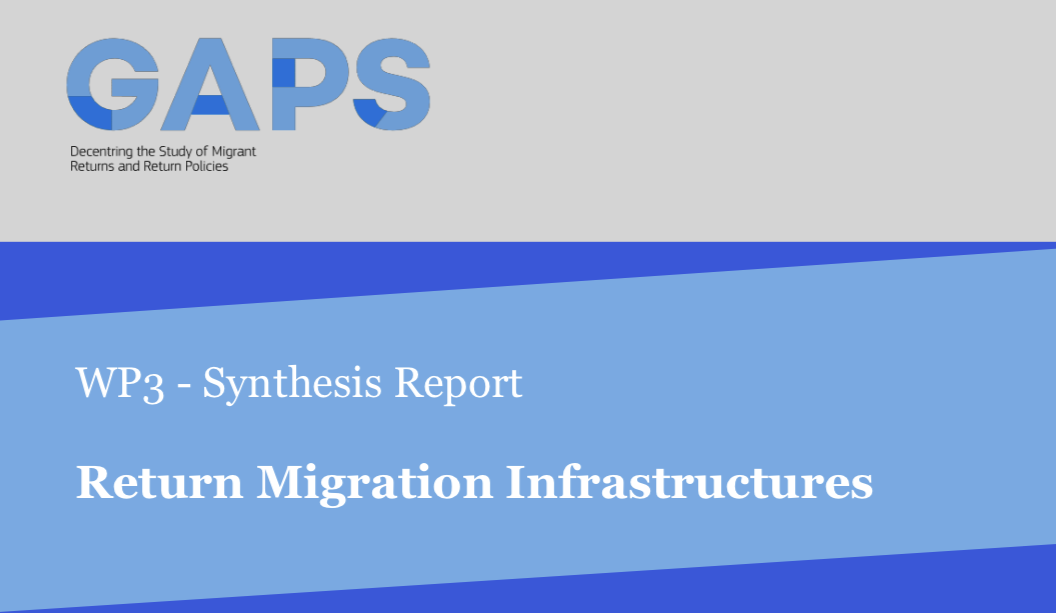Return Migration Infrastructures - WP3 Synthesis Report
Executive Summary:
This synthesis report is part of Work Package 3 of the GAPs ‘De-centring the Study of Migrant Returns and Readmission Policies in Europe and Beyond’ project. The report focuses on the concept of ‘Return Migration Infrastructures (RMIs)’, aiming to thoroughly study how return migration governance is put into practice at the everyday implementation level. Following the infrastructural turn in migration studies, RMIs are understood to be constituted by a web of actors, their ‘doings’, as well as the places, materialities, and technologies that together shape returns. This perspective challenges the idea that return migration governance follows a linear procedure by insisting that RMIs are characterised by messy realities on the ground.
Instead of reproducing a simplistic binary of voluntary versus forced returns, this synthesis report investigates an axis of coercion that includes three types of RMIs; the assisted returns, forced removals, and pushbacks/pushforwards. The analysis is based on the research findings of 10 country dossiers referring to 11 GAPs country cases, including European Union (EU) countries (Germany, Greece, the Netherlands, Poland, and Sweden), and non-EU countries (Georgia, Iraq, Morocco, Nigeria, Tunisia, and Turkey); the former focus on RMIs returning people from the EU, the latter on RMIs receiving returnees from the EU.
Within the emerging continuum of coercion, three infrastructural dimensions are examined: First, we trace the wide variety of actors, their diverse roles, and their relations. The web of actors involved is discussed based on the political and geographical scales at which they operate, namely the international, the supranational, the national/federal, the sub-national, and the community/local level. The research on their complex web of relationships and interactions unfolds, among others, the emergence of asymmetric power relations, relations of competition, and informality.
Second, the report analyses the practices of these actors (their ‘doings’), and the ways these facilitate or contest the implementation of returns. Here, the doings are analysed around four axes: i) the detection and differentiation of return cases; ii) the preparation of returns during the pre-departure stage; iii) the carrying out of the actual return work; and iv) the post-return activities. Concerning these practices, our findings include the existence of approaches ranging between ‘one-size-fits-all’ and ‘case-by-case’ that often create unequal positions for those returned; the importance and constitutive character of informalities for the operation of RMIs; the importance of ‘non-doings’ as a form of governance or a policy of non-policy, with the issue of detention as of crucial importance; aspects of irregularisation as inherent part of the RMIs; and crucially, the emergence of soft power techniques and communicative practices of power in returns’ implementation, efforts of building trust at the same time that enforcing particular return options, the importance of the migrants’ ‘collaborative’ behaviour in determining the type of return, and the efforts of enforcing voluntariness through enforced collaboration.
Third, the report discusses the places, materialities, and technologies constituting the RMIs. Among other emerging issues, it unfolds the diversity and shifting character of RMIs’ geographies, the overlap observed between return (exit) and reception (entry) spaces and infrastructures, and the importance of funding.
Based on the synthesis of the findings, the report also provides a fresh conceptualisation of RMIs by highlighting three pivotal dimensions: the crucial role of mediation, the social-material dimension of migration, and the political dimension of infrastructures, thus framing them as a question of power. Last but not least, three main, cross-cutting conclusions are discussed, along with a number of policy insights and recommendations relating to each one: the unbound character of RMIs which relates to the fact that RMIs are characterized by transnational and relational continuities and develop as crucial of a wider border control regime that seeks to ‘purify’ European societies from its unwelcome Others; RMIs as generators of informalities and the instrumentalisation of such informalities that emerge as constitutive characteristics of the ways RMIs are put into practice; and the force and power imbalances and dynamics that emerge.
Please find the entire DOI report by clicking the button below:

